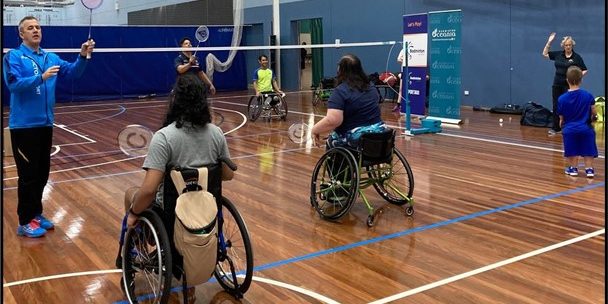November 2018 was the start of a new era for Para badminton in Oceania. The inaugural Australia Para Badminton International and VICTOR Oceania Para Badminton Championships in Geelong paved the way for the formation of development camps, enhanced coaching, communication and greater opportunities for Para badminton players across the region. So much so, that by 2020, the Continental Championships took place alongside the able-bodied tournament and saw an increased number of players and countries from Oceania competing.
‘The Melbourne project’ was another significant development which aided the understanding and planning of Para badminton – a product which fell out of a Head Office strategic planning session in late 2019.
A review identified that there had been initial growth in numbers following the announcement of Para badminton’s inclusion at the Tokyo 2020 Paralympic Games, however, participation numbers across the region appeared to have plateaued in recent years. To look at how Badminton Oceania could support members, a working group was set up to research and analyse the information available. The working group decided to focus on one specific region (Melbourne) and to have an in-depth review to understand the various challenges, obstacles which may have been hindering or restricting the sports ability to attract more participants.
The project was expected to take 12 months but due to global COVID-19 pandemic, it spanned over two years. The state of Victoria has endured six lockdowns and Melbourne has the unenviable record of having the most lockdowns globally. Over the two years, the working group experimented with various ideas to drive participation and raise awareness of the sport, including:
- Para Badminton State Development Squad – a player pathway with links to national and international opportunities
- Charter clubs – promoting and recognising clubs who have processes and systems in place to positively encourage person with disabilities to participate in badminton
- Developing strong partnerships – understanding both in the badminton community and external partners, including State Government agencies and private industry (various partners included Badminton Oceania, Badminton Victoria, Badminton Australia, Disability Sports Australia, University of Melbourne, All Abilities Play, National Disability Insurance Services and more)
- Intellectual disabilities – while Para badminton is primarily focused on physical disabilities, the Melbourne project also engaged with Special Olympics to raise awareness of the sport
- Ambassador programme – One male and one female player appointed to attend functions and events to provide greater promotion while developing their own personal skills
- Come and Try Days – trail sessions for people who are curious about a sport, removing barriers to participation. Isolated sports proved to work less than collaboration trial days (e.g. badminton’s inclusion in Australia Paralympic Committee Multi-sport come and try sessions)
- Female only events – following discussions with some females with a disability we have embarked on setting up a social program purely for females
- Disability data collection – a secure system designed to capture relevant information and accurate assessments of players with a disability
- ‘Inclusion or exclusion’ – considering the options of making pathways and performance structure inclusive or exclusive to those with disabilities
“A key element for success was the ability to change perceptions, mindsets, challenge current processes and throughout the time of this project, being able to strengthen partnerships and achieve a positive change in approach, allowing innovation and not being stifled by historical and sometimes regimented processes”, writes project lead and Badminton Oceania’s Coaching and Development Officer, Ian Bridge.
The key findings were as follows:
Key Findings
- Identify people for roles they can perform and ensure clarity over roles and purpose
- Be robust and challenge existing processes. In the same way COVID-19 has forced organisations to think and work differently, encourage innovation, open-mindedness creativity and trial/error
- The key skills and values required to make a positive difference include organisation, enthusiasm, and motivation
- Work collaboratively both internally and externally. The multi-sport trial sessions showed significant improvement than isolated sporting sessions
- A bottom-up approach proved to be most beneficial. Involve and engage Para badminton participants throughout the whole process to optimise implementation and benefits
- Continuous improvement is key for success. Review progress every 12 months to identify strength, weaknesses, opportunities and threats
As a results of the project and the various concepts, participation numbers in Melbourne have increased by over 300%. Obviously, COVID-19 created numerous complications, restrictions and consequently, a potentially lower return than operating in a non-COVID environment. However, the project outlines the foundations for building a successful future for Para Badminton in Oceania and beyond.
If you would like to view the full report, please contact office@badmintonoceania.org
Get the latest news and developments from Badminton Oceania delivered straight to your inbox by subscribing to our eNewsletter:






